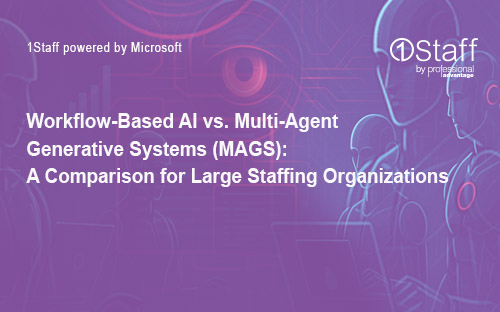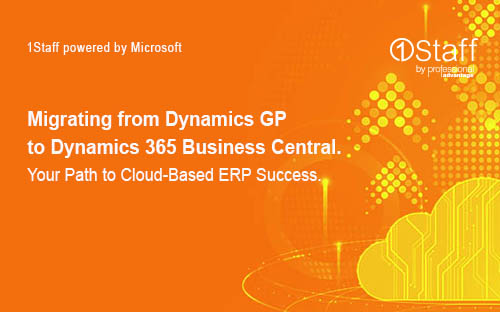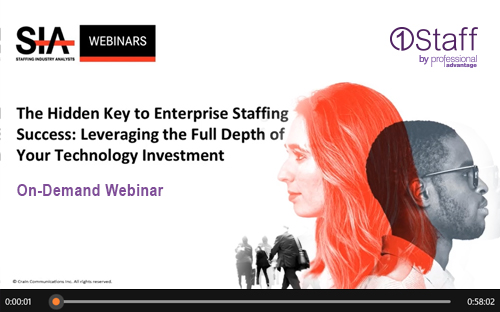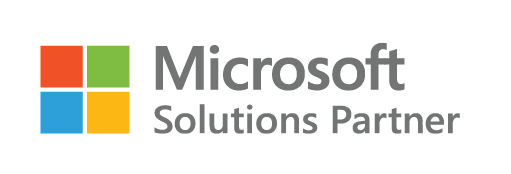As the staffing industry embraces artificial intelligence, two prominent approaches have emerged: workflow-based AI solutions and Multi-Agent Generative Systems (MAGS).
Both aim to streamline operations and enhance efficiency but differ significantly in their design, capabilities, and scalability.
For larger staffing organizations, understanding these differences is critical to choosing the right solution. It's also important to distinguish between types of AI agents. Basic LLM (Large Language Model) agents, which often power workflow-based solutions, differ significantly from Foundation or Cognitive Agents found in more advanced systems like MAGS.
Workflow-Based AI Solutions (Powered by Basic LLM Agents)
Workflow-based AI solutions automate predefined processes and tasks. These systems excel at streamlining repetitive tasks such as resume screening, interview scheduling, and onboarding. They often utilize basic LLM agents for simple natural language processing tasks.
| Strengths | Limitations |
|---|---|
| Ease of Implementation: Workflow-based solutions often come with pre-configured templates tailored to specific staffing use cases, making them quick to deploy. | Rigid Structures: These systems rely on predefined workflows, limiting their adaptability to new or dynamic business needs. Basic LLM agents within these systems have limited reasoning and adaptive capabilities. |
| Task Automation: They perform well in automating routine tasks like candidate outreach, document collection, and compliance checks. | Scaling Challenges: As staffing organizations grow, workflow-based AI may struggle to handle the increased volume or diversity of tasks without significant reconfiguration. |
| Cost-Effectiveness: For smaller-scale operations or those with straightforward processes, these tools offer a cost-effective way to improve efficiency. | Limited Intelligence: These systems often lack the ability to learn and adapt autonomously, requiring human intervention for updates or adjustments. Basic LLM agents lack the contextual awareness and long-term memory required for complex decision-making. |
Multi-Agent Generative Systems (MAGS) with Foundation/Cognitive Agents
MAGS represent a more advanced approach to AI, leveraging autonomous agents capable of learning, adapting, and collaborating in real-time. Unlike workflow-based systems, MAGS are designed for dynamic environments where flexibility and scalability are paramount. These systems utilize Foundation or Cognitive Agents, which possess advanced reasoning, planning, and learning capabilities.
| Strengths | Limitations |
|---|---|
| Dynamic Adaptability: MAGS can respond to changing business needs by autonomously adjusting their behavior based on real-time data and feedback. Foundation/Cognitive Agents enable this adaptability through continuous learning and complex reasoning. | Higher Initial Investment: Implementing MAGS requires a greater upfront investment in both technology and training. |
| Scalability: Built on robust architectures, MAGS can handle complex operations across multiple geographies and large-scale staffing demands without performance degradation. | Complexity of Deployment: Customizing MAGS for specific staffing workflows may take more time compared to plug-and-play workflow-based solutions. |
| End-to-End Intelligence: These systems go beyond task automation by offering predictive insights (e.g., workforce trends) and optimizing decision-making processes like candidate matching or workforce allocation. Foundation/Cognitive Agents provide the ability to analyze complex data sets and generate actionable insights. | |
| Collaboration Between Agents: MAGS employ multiple agents that work together seamlessly, enabling holistic solutions for interconnected staffing challenges such as compliance management, talent retention, and workforce planning. |
Why MAGS Are Ideal for Larger Staffing Organizations
For tier-1 staffing firms managing large-scale operations across diverse markets, MAGS offer several distinct advantages:
Handling Complexity at Scale:
Large organizations often deal with fluctuating demand, multi-region compliance requirements, and diverse talent pools. MAGS excel at managing these complexities by dynamically adapting to new conditions without requiring constant reconfiguration.
Future-Proofing Operations:
As the staffing industry evolves, MAGS provide a flexible foundation that can integrate emerging technologies or adapt to new market trends seamlessly.
Enhanced Decision-Making:
By leveraging generative intelligence, MAGS enable data-driven decisions that improve hiring accuracy and workforce planning—key priorities for large firms.
Improved Candidate Experience:
With their ability to personalize interactions at scale, MAGS ensure candidates receive tailored communication and support throughout the hiring process.
Operational Efficiency:
Autonomous agents reduce administrative overhead by taking over complex workflows like compliance audits or multi-stage candidate evaluations.
Conclusion
While workflow-based AI solutions, powered by basic LLM agents, are suitable for smaller organizations or those with straightforward processes, they often fall short when it comes to scaling or adapting to complex environments. In contrast, Multi-Agent Generative Systems (MAGS), utilizing Foundation/Cognitive Agents, provide the flexibility, intelligence, and scalability needed by larger staffing organizations operating in dynamic markets.
For tier-1 firms seeking a future-ready solution that can grow with their business while optimizing every aspect of their operations—from candidate sourcing to workforce allocation—MAGS stand out as the superior choice. By investing in this advanced framework, staffing companies can not only meet today’s challenges but also position themselves as leaders in an increasingly competitive industry.
Get in touch to see how MAGS-based agentic AI will position your large and complex staffing agency for 2030 and beyond. Request a demo to find out more.

More from the blog!
Multi-Agent Generative Systems (MAGS): The very big brother of LLM AI.
The world of Artificial Intelligence is rapidly evolving, presenting staffing organizations with powerful new tools. Among these advancements, Multi-Agent Generative Systems (MAGS) stand out as a transformative technology, offering capabilities far beyond those of basic LLM agents.
Read the blog...
Start planning your Dynamics GP migration
Discover how you can make the most of this offer by reading more.
Read more...

On-demand Webinar
The Hidden Key to Enterprise Staffing Success: Leveraging the Full Depth of Your Technology Investment
Join our expert panel as they delve into the latest trends and strategies for leveraging Microsoft technology to drive success in the staffing industry.
Register to watch...